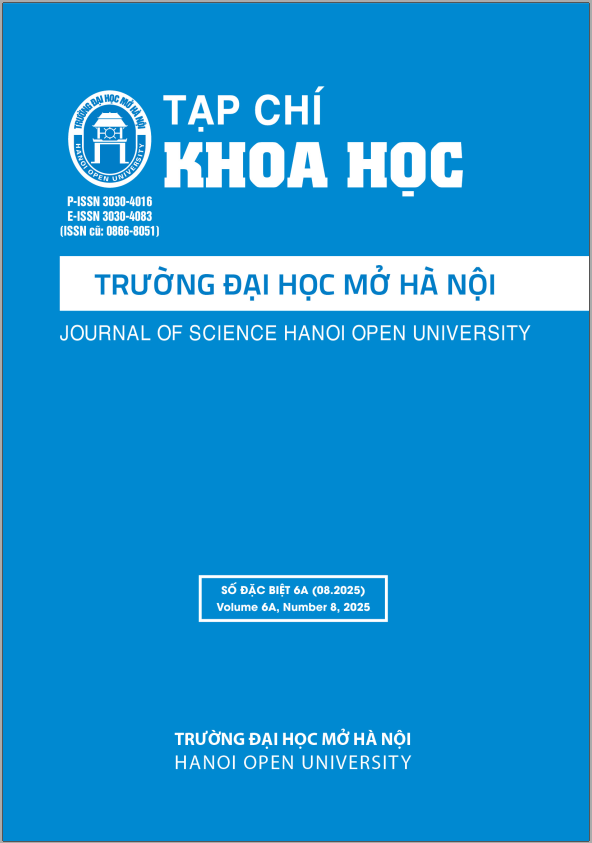AI VÀ LIÊM CHÍNH HỌC THUẬT TRONG GIÁO DỤC ĐẠI HỌC
DOI:
https://doi.org/10.59266/houjs.2025.662Keywords:
liêm chính học thuật, AI, chat GPT, nghiên cứu khoa học, đạo vănAbstract
Trí tuệ nhân tạo (AI) đang tái định nghĩa các giá trị học thuật, vừa mang đến những động lực thúc đẩy cho nghiên cứu, vừa đặt ra những thách thức đối với tính liêm chính học thuật. Nghiên cứu này tìm hiểu các cách thức sử dụng AI một cách hợp lý và có trách nhiệm trong học thuật. Bên cạnh đó, bài viết chỉ ra một số sai lầm điển hình, chẳng hạn như sự phụ thuộc quá mức vào AI mà không sử dụng tư duy phản biện hoặc thiếu sự kiểm chứng đối với tính chính xác của nội dung được tạo ra bởi AI. Trên cơ sở đó, tác giả cũng đề xuất một số khuyến nghị cho cộng đồng nghiên cứu, nhằm tận dụng một cách hiệu quả tiềm năng của AI trong việc hỗ trợ truyền tải tri thức, đồng thời bảo vệ và củng cố tính liêm chính học thuật.
References
[1]. Alexander, K., Savvidou, C., & Alexander, C. (2023). Who wrote this essay? Detecting AI-generated writing in second language education in higher education. Teaching English with Technology, 23(2), 25-43
[2]. https:// files.eric.ed.gov/ fulltext/ EJ1397565.pdf
[3]. Amanda Mphahlele., Sioux McKenna (2019): The use of turnitin in the higher education sector: Decoding the myth, Assessment & Evaluation in Higher Education.
[4]. https://doi.org/10.1080/02602938.2019
.1573971
[5]. American Psychological Association. (2018). Integrity. APA Dictionary of Psychology. https://dictionary.apa.org/ integrity
[6]. American Psychological Association. (2023, November). APA journals policy on generative AI: Additional guidance.
[7]. https://www.apa.org/pubs/journals/ resources/publishing-tips/policy- generative-ai
[8]. Ashikuzzaman, M. (2024). The impact of plagiarism on academic integrity and credibility. Library & Information Science Education Network.
[9]. https://www.lisedunetwork.com/the- impact-of-plagiarism-on-academic- integrity-and-credibility/
[10]. Bretag, T. (2013). Challenges in Addressing Plagiarism in Education. PLoS Medicine, 10(12): e1001574. https:// doi. org/ 10. 1371 / journal. pmed.1001574
[11]. Erol, G., Ergen, A., Gülşen Erol, B., Kaya Ergen, Ş., Bora, T. S., Çölgeçen,
A. D., Araz, B., Şahin, C., Bostancı, G., Kılıç, İ., Macit, Z. B., Sevgi, U. T., & Güngör, A. (2025). Can we trust academic AI detective? Accuracy and limitations of AI-output detectors. Acta neurochirurgica, 167(1), 214.
[12]. https://pmc.ncbi.nlm.nih.gov/articles/ PMC12331776/
[13]. Evangelista, E. D. L. (2025). Ensuring academic integrity in the age of ChatGPT: Rethinking exam design, assessment strategies, and ethical AI policies in higher education. Contemporary Educational Technology, 17(1), ep559.
[14]. https://doi.org/10.30935/cedtech/15775
[15]. Gonsalves, C. (2024). Addressing student non-compliance in AI use declarations: implications for academic integrity and assessment in higher education. Assessment & Evaluation in Higher Education, 50(4), 592-606.
[16]. https://doi.org/10.1080/02602938.2024.2415654
[17]. International Center for Academic Integrity. (2021). The fundamental values of academic integrity (3rd ed.). https://academicintegrity. org/aws/ICAI/asset_manager/get_ file/911282?ver=1
[18]. McAdoo, T. (2024, February 23). How to cite ChatGPT. APA Style Blog.
[19]. https://apastyle.apa.org/blog/how-to- cite-chatgpt
[20]. National Academies of Sciences, Engineering, and Medicine. (2017). Fostering integrity in research. The National Academies Press.
[21]. https://grants.nih.gov/sites/default/ files/Fostering-Integrity-In-Research. pdf
[22]. Normandale Community College Library. (2024, January 4). APA citations for content generated by artificial intelligence (AI) tools.
[23]. https://www.normandale.edu/_files/ documents/library/ai-apa.pdf
[24]. Patwardhan, B., Thakur, A. (2020). Academic integrity and research quality. University Grants Commission, India.
[25]. https://sushantuniversity.edu.in/admin- assets/uploaddata/UGC-Booklet-on- Academic-Integrity-and-Research-Quality.pdf
[26]. Regev, S., Snir, S. (2022). Does creative thinking contribute to the academic integrity of education students? Frontiers in Psychology, 13, 925195.
[27]. h t t p s : / / d o i . o r g / 1 0 . 3 3 8 9 / fpsyg.2022.925195
[28]. Resnik, D.B., Hosseini, M. The ethics of using artificial intelligence in scientific research: new guidance needed for a new tool. AI Ethics 5, 1499-1521 (2025).
[29]. https://doi.org/10.1007/s43681-024-00493-8
[30]. Taugienė, L. (2019). General guidelines for academic integrity (Version 1.1). International Center for Academic Integrity.
[31]. https://academicintegrity.eu/wp/wp- content/uploads/2022/04/Guidelines_ amended_version_1.1_09_2019.pdf
[32]. Taylor, S., Martinez, J., & Thompson, L. (2023). The impact of AI writing tools on the content and organization of student work: A mixed methods study. Education and Information Technologies, 28(6), 6785-6802.
[33]. https://doi.org/10.1080/233118 6X.2023.2236469
[34]. Wong, S. S. H., Lim, S. W. H., & Quinlan, K. M. (2016). Integrity in and beyond contemporary higher education: What does it mean to university students? Frontiers in Psychology, 7, 1094. https://doi.org/10.3389/ fpsyg.2016.01094
[35]. Zimba, O., Gasparyan, A. Y. (2021). Plagiarism detection and prevention: a primer for researchers. Rheumatology, 59(3), 132-137.
[36]. https://pmc.ncbi.nlm.nih.gov/articles/ PMC8436797/.
